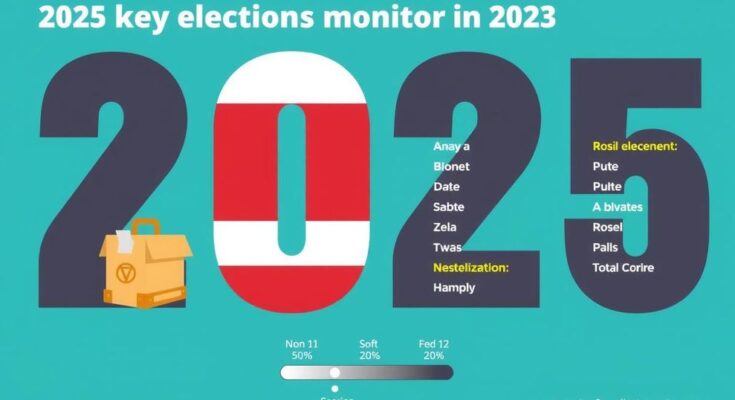In 2025, five crucial elections in Belarus, Germany, the Philippines, Canada, and Chile will shape their political futures amidst various challenges including inflation and the rise of populism. Key themes include Lukashenko’s autocratic rule in Belarus, a snap election in Germany, senatorial races in the Philippines affecting the Marcos administration, potential early elections in Canada, and Chile’s presidential runoff amidst a backdrop of political and economic normalization.
In the year 2025, several significant elections are set to take place across the globe, each reflecting pressing issues such as inflation, the rise of populism, and geopolitical tensions. Among these elections, Belarus is notable for the January 26th presidential election, where Alexander Lukashenko is expected to secure a seventh term amid claims of oppression and lack of genuine opposition. Following this, Germany will hold a crucial federal election on February 23rd to address economic challenges and political instability after the collapse of the current coalition.
The Philippines is also gearing up for senatorial elections on May 12th, which will be largely regarded as a referendum on President Ferdinand Marcos Jr.’s political influence as he navigates his relationship with Vice President Sara Duterte amidst growing political tensions. Canada may see a federal election before October 20th, driven by Prime Minister Justin Trudeau’s declining approval ratings and the threat of losing his coalition government. Finally, Chile’s presidential election on November 16th will culminate in a runoff, likely reflecting the country’s ongoing civil discourse and the challenges of establishing a stable government post-upheaval. Each of these elections holds substantial implications for the respective nations, shaping their policies and international relations for years to come.
The article discusses five key elections scheduled for 2025 that may significantly influence both national and international dynamics. With the world recovering from the upheavals of the past few years, especially the pandemic and geopolitical tensions, these elections reflect underlying themes such as social unrest, the rise of populism, and critical economic considerations. Each country faces its unique challenges, which will prominently feature in the electoral discourse and outcomes.
The elections in 2025 across Belarus, Germany, the Philippines, Canada, and Chile will be pivotal in shaping their respective political landscapes and international relations. As their leaders navigate challenges such as political opposition, economic instability, and social unrest, the outcomes will likely reflect broader global trends, including reactions to populism and the quest for stable governance. Public sentiment and participation will ultimately play a crucial role in determining the future trajectories of these nations.
Original Source: theconversation.com




